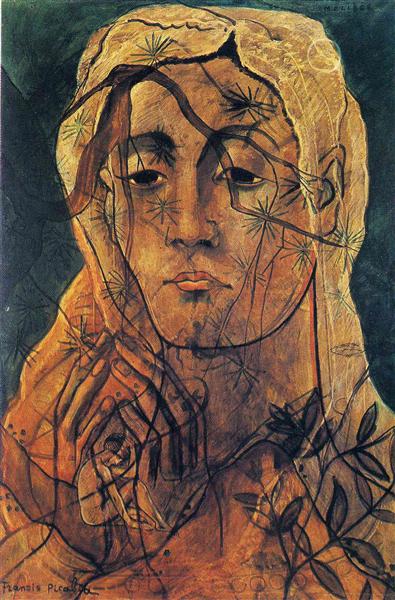Description
The "Melibeo" painting of Francis Picabia, created in 1918, is located at a crucial moment of modern art, where Dadaism and surrealism begin to merge into the expressions of artists who seek to break with the aesthetic betrayal of the past. The work, whose title refers to a pastor of Roman mythology, causes a reflection on happiness and loneliness, issues that often permeate the work of Picabia.
In this painting, the artist uses a composition that reveals his ability to abstraction while presenting figurative forms. The work is marked by a bold and contrasting use of color, with predominance of warm tones that provide an almost tropical vitality to the scene. An interaction between figurative and abstract elements can be observed, which denotes the experimental approach of Picabia. The central figure, which seems to represent a naked young man, evokes a sense of vulnerability and contemplation, trapped in a kind of dialogue with what surrounds her. Beside him, the abstract elements add a dimension of uncertainty and tension, symbolizing the search for meaning in a chaotic world.
The color palette, rich in ocher, gold and reddish tones, generates a warm atmosphere that invites the viewer to immerse himself in the environment that Picabia has created. The contrasts between the lights and shadows reinforce the three -dimensionality of the human figure, which contrasts with the flat and repetitive patterns of the background, which is characteristic of their style. The landscapes that are hinted flat can be interpreted as a reflection of the character's internal world, suggesting an environmental and imagined environment.
Picabia, known for his versatility and his appetite for innovation, challenges the viewer to question the artistic conventions of his time. His stage in the Dadaist movement influences the way this work combines the grotesque with the sublime, referring to the duality of human experience. "Melibeo" also resonates with the romantic traditions of the lonely figure, a topic that occupies a special place in art history, but which is treated here with the ambiguous look of an artist who feels equally attracted to beauty and absurd .
In the context of contemporary art, "Melibeo" reminds us of the unconventional approach of Picabia towards representation. His ability to intertwine the figurative and the abstract prepares the terrain for an exploration of art that will be key to several posterior currents, such as surrealism and abstract expressionism. Thus, although "Melibeo" can at first glance seem a difficult reading, it is in this complexity in which its lasting interest resides. In it, we can feel the search for Picabia to find a new visual language, a path that defies viewers to get involved not only with what they see, but also with what they feel.
In summary, "Melibeo" is a work that invites deep contemplation, echoing the concerns of the human being in a changing world. The painting, with its rich combination of technique and symbolism, continues to serve as a reference point between classical art and new avant -garde, while establishing Francis Picabia as a unique and crucial figure in the history of modern art.
KUADROS ©, a famous paint on your wall.
Hand-made oil painting reproductions, with the quality of professional artists and the distinctive seal of KUADROS ©.
Art reproduction service with satisfaction guarantee. If you are not completely satisfied with the replica of your painting, we refund your money 100%.

